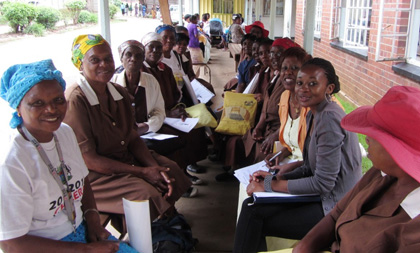'Friendship Bench': scaling up mental health services in Zimbabwe
Grand Challenges Canada has awarded $US 852,000 to an international team of researchers to evaluate the effectiveness of the 'Friendship Bench' - a mental health intervention delivered by community health workers in Zimbabwe.
The project is led by the University of Zimbabwe in collaboration with King's College London's Institute of Psychiatry and several over international organisations. The aim is to provide an evidence base to scale up the intervention to 33 clinics in Harare, the capital of Zimbabwe, in order to better treat people who suffer from common mental health disorders.
Over 30% of people who use primary health care facilities in Zimbabwe suffer from common mental disorders, mostly depression and anxiety. Despite the lack of professional human resources in health, there are 460 health workers in Harare and over 12,000 community, or 'lay' health workers across the country.
The 'Friendship Bench' is a brief intervention delivered by supervised lay health workers, employed by the City of Harare Health Department as health promoters, who have received training in problem solving therapy - a cognitive-behavioural intervention geared to improve an individual's ability to cope with stressful life experiences. The intervention consists of six structured 45-minute sessions delivered on a wooden bench within the grounds of a clinic in a discrete area.
.jpg)
A trained health worker counsels a young mother on the Friendship Bench in Zimbabwe.
Researchers from the University of Zimbabwe and King's Institute of Psychiatry previously analysed data from the Friendship Bench which has been running since 2006 in primary care clinics in the Mbare district of Harare. The pilot study shows that the intervention is well accepted, feasible and potentially effective. In Harare, 33 primary care clinics refer over 600 patients per month to 3 mental health specialists. The 460 lay health workers currently employed in the same clinics could potentially be incorporated into the Friendship Bench program but currently lack the necessary training and support.
Dr Dixon Chibanda, Honorary Research Associate at King's College London's Institute of Psychiatry and Consultant Psychiatrist in Harare who leads the Friendship Bench project, says: "Screening and treatment of common mental disorders at primary care level needs to become routine, and the Friendship Bench is an excellent example of a community intervention. Recognising common mental health problems in this way can help reduce suffering for patients, reduce referrals to specialist care, and ultimately improve the functioning of a sizeable proportion of the population of Zimbabwe."
In the current study, the researchers aim to refine and enhance the existing intervention and test methodological aspects of the trial; test the effectiveness and cost-effectiveness of the intervention, compared to enhanced usual care, through a cluster randomized trial using 12 primary care clinics in Zimbabwe.
Dr Melanie Abas, co-investigator of the study at King's College London says: "Lay health workers constitute a vital resource that if empowered and supported appropriately may significantly improve the health status of Zimbabweans. Our pilot data supports the feasibility of employing these lay health workers to treat common mental disorders through the Friendship Bench program; however, there is a need to rigorously test this intervention before it can be scaled up to all local clinics in the country. This is the first effectiveness trial of any brief intervention for common mental disorders in Africa."
Professor Paul McCrone, from King's Institute of Psychiatry will also be collaborating in the project - Professor McCrone and Dr Abas are both members of the King's Health Partners Centre for Global Mental Health.
The project is one of 15 innovative and pioneering projects funded by Grand Challenges Canada designed to improve mental health diagnosis and care in developing countries. The projects were selected through competitive scientific peer review from among 97 ideas submitted in response to a Grand Challenge that focuses on increased access and improved treatment, and addresses stigma for people with mental health disorders in developing countries.

Friendship Bench health workers and a local coordinator discuss training materials
The project will be administered through the Zimbabwe AIDS Prevention Project of University of Zimbabwe (ZAPP-UZ) and led by the University of Zimbabwe with colleagues from King's College London's Institute of Psychiatry, Bristol University, Ryerson University and London School of Hygiene & Tropical Medicine, in collaboration with Northwestern University's Centre for Behavior Intervention Technologies (CBIT), local mobile phone operators, SpiritAge IT, and Mesereo.
For further information, please contact Seil Collins, Press Officer, Institute of Psychiatry, King's College London, emai: seil.collins@kcl.ac.uk or tel: 0207 848 5377
About King's College London
About Grand Challenges Canada
Grand Challenges Canada is dedicated to supporting bold ideas with big impact in global health. We are funded by the Government of Canada through the Development Innovation Fund announced in the 2008 Federal Budget. We fund innovators in low- and middle-income countries and Canada. Grand Challenges Canada works with the International Development Research Centre (IDRC), the Canadian Institutes of Health Research (CIHR) and other global health foundations and organizations to find sustainable, long-term solutions through integrated innovation – bold ideas that integrate science, technology, social and business innovation. Grand Challenges Canada is hosted at the Sandra Rotman Centre.